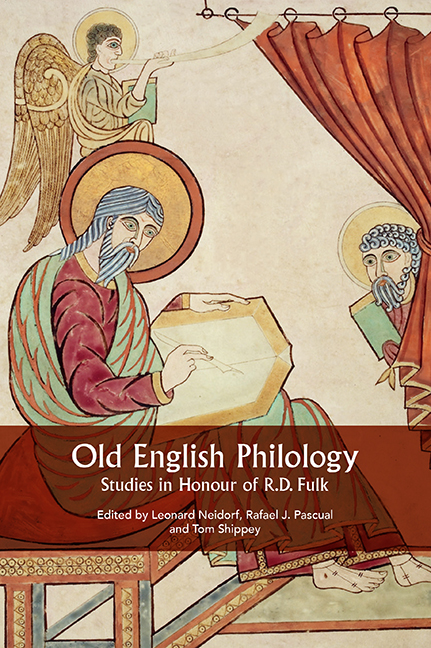Book contents
- Frontmatter
- Contents
- List of Illustrations
- Acknowledgements
- List of Contributors
- Introduction: R.D. Fulk and the Progress of Philology
- 1 Sievers, Bliss, Fulk, and Old English Metrical Theory
- 2 Ictus as Stress or Length: The Effect of Tempo
- 3 Metrical Criteria for the Emendation of Old English Poetic Texts
- 4 The Suppression of the Subjunctive in Beowulf: A Metrical Explanation
- 5 Metrical Complexity and Verse Placement in Beowulf
- 6 Alliterating Finite Verbs and the Origin of Rank in Old English Poetry
- 7 Prosody-Meter Correspondences in Late Old English and Poema Morale
- 8 The Syntax of Old English Poetry and the Dating of Beowulf
- 9 The Anglo-Saxons and Superbia: Finding a Word for it
- 10 Old English gelōme, gelōma, Modern English loom, lame, and Their Kin
- 11 Worm: A Lexical Approach to the Beowulf Manuscript
- 12 Wulfstan, Episcopal Authority, and the Handbook for the Use of a Confessor
- 13 Some Observations on e-caudata in Old English Texts
- 14 The Poetics of Poetic Words in Old English
- 15 Dream of the Rood 9b: A Cross as an Angel?
- 16 The Fate of Lot’s Wife: A ‘Canterbury School’ Gloss in Genesis A
- 17 Metrical Alternation in The Fortunes of Men
- 18 The Originality of Andreas
- 19 The Economy of Beowulf
- 20 Beowulf Studies from Tolkien to Fulk
- The Writings of R.D. Fulk
- Index
- Tabula Gratulatoria
- Anglo-Saxon Studies
20 - Beowulf Studies from Tolkien to Fulk
Published online by Cambridge University Press: 29 May 2021
- Frontmatter
- Contents
- List of Illustrations
- Acknowledgements
- List of Contributors
- Introduction: R.D. Fulk and the Progress of Philology
- 1 Sievers, Bliss, Fulk, and Old English Metrical Theory
- 2 Ictus as Stress or Length: The Effect of Tempo
- 3 Metrical Criteria for the Emendation of Old English Poetic Texts
- 4 The Suppression of the Subjunctive in Beowulf: A Metrical Explanation
- 5 Metrical Complexity and Verse Placement in Beowulf
- 6 Alliterating Finite Verbs and the Origin of Rank in Old English Poetry
- 7 Prosody-Meter Correspondences in Late Old English and Poema Morale
- 8 The Syntax of Old English Poetry and the Dating of Beowulf
- 9 The Anglo-Saxons and Superbia: Finding a Word for it
- 10 Old English gelōme, gelōma, Modern English loom, lame, and Their Kin
- 11 Worm: A Lexical Approach to the Beowulf Manuscript
- 12 Wulfstan, Episcopal Authority, and the Handbook for the Use of a Confessor
- 13 Some Observations on e-caudata in Old English Texts
- 14 The Poetics of Poetic Words in Old English
- 15 Dream of the Rood 9b: A Cross as an Angel?
- 16 The Fate of Lot’s Wife: A ‘Canterbury School’ Gloss in Genesis A
- 17 Metrical Alternation in The Fortunes of Men
- 18 The Originality of Andreas
- 19 The Economy of Beowulf
- 20 Beowulf Studies from Tolkien to Fulk
- The Writings of R.D. Fulk
- Index
- Tabula Gratulatoria
- Anglo-Saxon Studies
Summary
J.R.R. Tolkien's British Academy lecture of 1936 has been hailed many times as marking a new era in Beowulf-studies. It also marked the end of an era. His allegory of the tower, his comic rendition of the Babel of conflicting voices, these, as R.D. Fulk has pointed out, are a “derisive” if genial critique of a whole largely-German tradition of nineteenth-century scholarship (2007c: 133). Much of this was admittedly fanciful, and much of it was tainted by a romantic nationalism rendered unacceptable in the twentieth century. Yet it was also powered by the achievements of comparative philology, for the humanities the Darwinian discipline of the nineteenth century and beyond, and Tolkien's own ruling passion: he said of himself, “I am a pure philologist” (Tolkien 1981: 264). It is a sad irony that his 1936 lecture in practice handed over the entry-permit to his favorite poem to people whom he might have classed all too often as “misologists.” Ever since 1936, one might say, there has been a struggle going on for the soul of Beowulf-studies; and for a long time, whatever Tolkien might have wished, it was his professional adversaries the critics, the New Critics, the literary critics, who were winning.
This was not immediately apparent. Considering the praise lavished on the 1936 lecture since, it is surprising how little notice of it was taken at the time. The most perceptive of the three reviews it received came from Friedrich Klaeber. He gave Tolkien credit for his “engaging warmth and power of persuasion,” but added that “some unavoidable questions” remained unanswered, and the whole “hinted more than it performed” (1937: 323). Moreover, when scholarly attention began to turn back to Beowulf after World War II, both T.M. Gang (1952) and J.C. van Meurs (1955) were unimpressed. Tolkien argued in a circle (Gang, 3); he made unwarranted assumptions about pre-Christian English mythology (van Meurs, 119); his comparison of the poem's structure to that of the alliterative line was just an “accidental resemblance” (van Meurs, 119); moreover, “it is extremely difficult to see what his critical position is” (Gang, 10–11). Nevertheless, Tolkien had made one point which, in the English-speaking world, was all but universally accepted and welcomed, which was that it was time to read the poem simply for itself, as a work of art.
- Type
- Chapter
- Information
- Old English PhilologyStudies in Honour of R.D. Fulk, pp. 392 - 414Publisher: Boydell & BrewerPrint publication year: 2016



